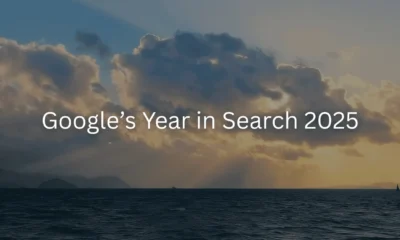Google Reveals Top Searches of 2020

Google’s annual list of top trending search terms shows what the world turned to Google for during one of the most historic years on record.
“2020 was the year we asked “why?”” – Google states in the introduction to its report.
People asked “why?” more than ever before as they searched Google for answers to all types of questions, which you’ll see in the following section.
Users broke records for the number of times “what day is it?” was searched for in a year. Searches for recipes also hit a record high.
Above all, coronavirus is the subject at the top of everyone’s minds. Many of the top searches reflect how people are adapting to the new normals of daily life.
Google’s report looks at trending topics across search, news, people, how-to’s, virtual activities, and more. The data can be viewed worldwide or filtered by 70 different countries.
Here you’ll find highlights from the top trending searches lists in the USA and worldwide.
Top Trending Google Searches in USA
First let’s look at the overall top searches in USA. To no surprise, coronavirus 3 out of the top 5 spots.
Overall Top Searches
- Election results
- Coronavirus
- Kobe Bryant
- Coronavirus update
- Coronavirus symptoms
Next let’s look at the types of information people are seeking. Google is getting more granular this year by breaking up its ‘how-to’ search data into different categories.
There’s now categories for beauty how-to’s, how to donate, how to make, how to help, and how to style.
Taking a look at the “how to make” category you can see how people are looking for ways to stay safe by making materials at home.
Top “How to Make” Searches
- How to make hand sanitizer
- How to make a face mask with fabric
- How to make whipped coffee
- How to make a mask with a bandana
- How to make a mask without sewing
The top beauty how-to’s also illustrate how people are adapting to doing more things at home. And there’s a not insignificant amount of people searching for how to wash their hands.
Top Beauty How-To Searches
- How to cut men’s hair at home
- How to plop hair
- How to color your hair at home
- How to wash your hands
- How to style curtain bangs
Teaching people how to do things at home, especially things they previously would have gone out for, feels like a strong category to create content around at the moment.
Google introduced another new category of top searches this year for “virtual” terms. As all in-person activities go virtual, this is what people are searching for most.
Top “Virtual” Searches
- Virtual field trips
- Virtual museum tours
- Virtual Kentucky Derby
- Virtual learning
- Virtual NBA fans
A look at the top searches in the “… during coronavirus” category shows that people were looking for ways to gain financially from the pandemic. Others were looking for new ways to do ordinary things, and others were simply looking to get jobs.
Top “… during coronavirus” Searches
- Best stocks to buy during coronavirus
- Dating during coronavirus
- Dentist open during coronavirus
- Unemployment during coronavirus
- Jobs hiring during coronavirus
Lastly, let’s look at the aforementioned “why” category, which saw record search volume this year.
Top “Why?” Searches
- Why were chainsaws invented
- Why is there a coin shortage
- Why was George Floyd arrested
- Why is Nevada taking so long
- Why is TikTok getting banned
Top Trending Google Searches Worldwide
There’s many fewer categories of data available for the global searches segment. Here’s a look at some of the more interesting ones.
Top Overall Searches
- Coronavirus
- Election results
- Kobe Bryant
- Zoom
- IPL
Top Concert Searches
- Together At Home concert
- Fire Fight Australia concert
- Garth Brooks drive in concert
- Travis Scott Fortnite concert
- BTS online concert
Top Recipe Searches
- Dalgona coffee
- Ekmek
- Sourdough bread
- Pizza
- Lahmacun
Top Movie Searches
- Parasite
- 1917
- Black Panther
- 365 Dni
- Contagion
See the full set of data here.
Is there anything more 2020 than presenting the data in story format? Because Google’s gone and done that as well.
More search highlights from 2020 can also be seen in the video below.



![How AEO Will Impact Your Business's Google Visibility in 2026 Why Your Small Business’s Google Visibility in 2026 Depends on AEO [Webinar]](https://articles.entireweb.com/wp-content/uploads/2026/01/How-AEO-Will-Impact-Your-Businesss-Google-Visibility-in-2026-400x240.png)
![How AEO Will Impact Your Business's Google Visibility in 2026 Why Your Small Business’s Google Visibility in 2026 Depends on AEO [Webinar]](https://articles.entireweb.com/wp-content/uploads/2026/01/How-AEO-Will-Impact-Your-Businesss-Google-Visibility-in-2026-80x80.png)













